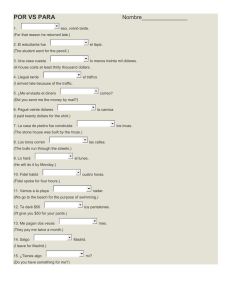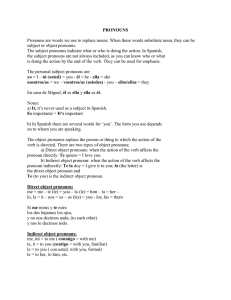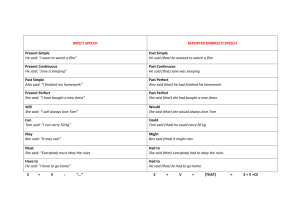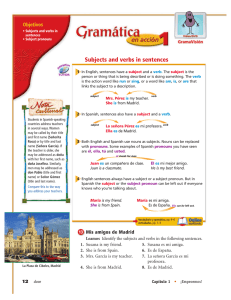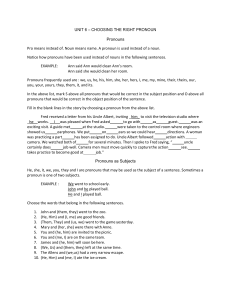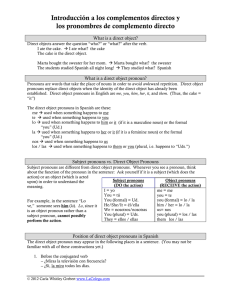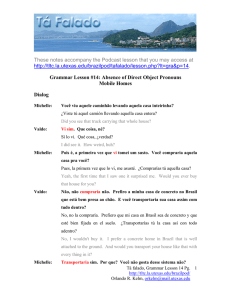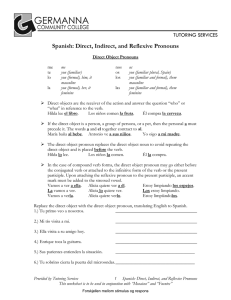Direct and Indirect Object Pronouns
Anuncio
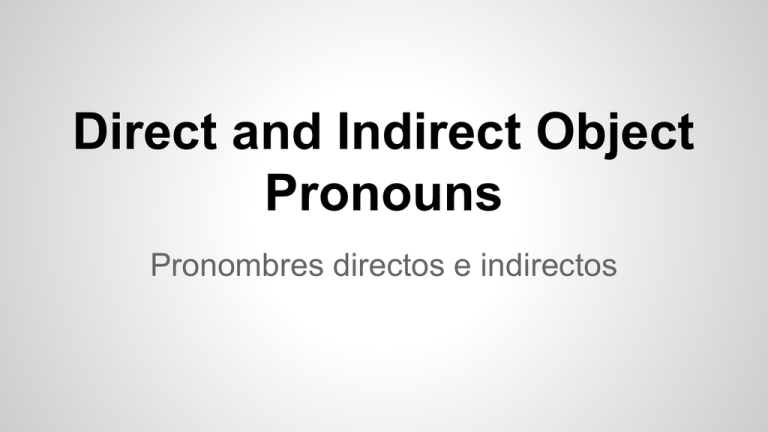
Direct and Indirect Object Pronouns Pronombres directos e indirectos Direct Objects: answer who? or what? after the verb She boarded the train. We set the table. I paid the bill. Can we order dessert? They texted the girl. My class always throws the dice. Indirect Objects: answer for whom? or to whom? after the verb She paid the bill for me. He told Susana the truth. (He told the truth to Susana.) She made dessert for Elena. We threw the ball to the students. I wrote a letter to my cousin. Nacho throws the dice to Juan. Direct/Indirect Objects Diagram these! 1. 2. 3. 4. She gave me the check. I told her the story. We lent the books to you. I’ll bring you the money. Direct Object Pronouns me→ me te→ you lo→ for masculine singular direct objects la→ for feminine singular direct objects nos→ us os→ you all (Spain only) los→ for masculine plural direct objects las→ for feminine plural direct objects Where do pronouns go in a sentence in English? They go after the verb: She threw it. She didn’t call me. She threw it to me. She didn’t send it to me. Where do pronouns go in a sentence in Spanish? They go right before the verb: Ella la echó. Ella no me llamó. Ella me la echó. Ella no me lo mandó. Indirect object pronouns go before direct object pronouns. (Just like the diagrams!) Extra Information: 1. Pronouns can get attached to the end of verbs that aren’t conjugated OR that are in the present participle form (-ando, -iendo): Ella quiere comprarlo. She wants to buy it. 2. Pronouns get attached to the end of affirmative commands: ¡Dámelo! Give it to me! ¡Échamela! Throw it to me! 3rd Person Double Object Pronouns me, te, nos, os can stay the same in front of lo/la/los/las BUT: le, les change to → se it’s not reflexive, it’s just a change in “le” Repaso pp. 431-432 using “lo” as a replacement for clauses, adjectives, predicate nouns --Los Ochoa se mudaron a Ecuador. --Sí, lo sé. --¿María es simpática? --Sí, lo es. Translations 1. Do you know if the stores are open? --I couldn’t (sabría) tell you. 2. Is Ramón a student? --No he’s not. 3. I think he’s smart. --Yes, he is. Answers 1. Do you know if the stores are open? --I couldn’t tell you. No 2. sabría decir./No sabría decírtelo. Is Ramón a student? --No he’s not. No, no lo es. I think he’s smart. --Yes, he is. Sí, lo es. 3. te lo Idioms that use double object pronouns apañárselas = to manage, get by arreglárselas = to manage, get by componérselas = to manage, get by echárselas de + adjective/noun = to brag of being habérselas con = to be up against, face tenérsela jurada a uno = to have it in for someone vérselas con = to explain oneself to Translations with idioms 1. I don’t know how Raúl manages. He thinks everyone has it in for him. 2. Any student who behaves badly (portarse mal) will have to explain him/herself to me. 3. She has to face another day at her job. 4. They always brag about being so smart. Answers No sé cómo Raúl se las apaña/arregla/compone. Cree que todo el mundo se la tiene jurada. 1. I don’t know how Raúl manages. He thinks everyone has it in for him. 2. Any student who behaves badly will have to explain him/herself to me. 3. 4. Cualquier estudiante que se porte mal tendrá que vérselas conmigo. She has to face another day at her job. Tiene que habérselas con otro día en su trabajo. They always brag about being so smart. Siempre se las echan de inteligente.


